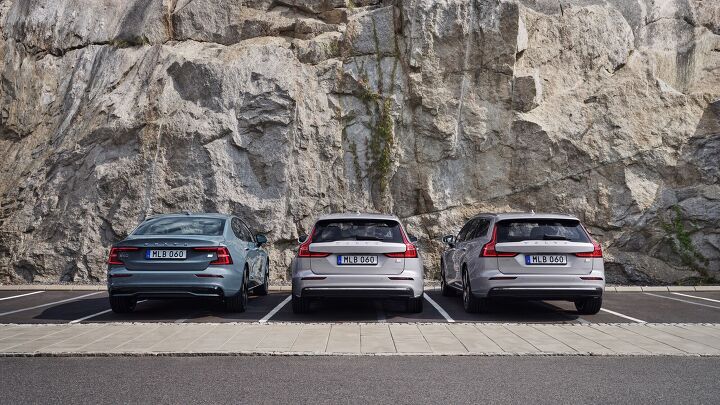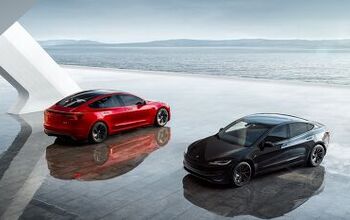Volvo Ending Sedan/Wagon Sales in UK, Could North America Be Next?

Volvo Cars is suspending sedan sales in the United Kingdom and it looks like North America could be next if we consider the brand’s rationale. The company has said its sales volume has skewed so heavily toward SUVs and crossovers that it doesn’t make good sense to offer anything else.
The Swedish-Chinese brand had already pulled the S90 from the market earlier this summer. But Volvo expressed its intention to further consolidate its lineup as a way to boost profitability and appears to be taking steps toward that goal. On Tuesday, Autocar noticed that the brand’s online configurator for the U.K. is now absent the S60, V60, and V90.
While the Cross Country variants of the wagons had already been scrubbed, standard variants seem to be following them into the abyss — following the current industry trend of chasing margins, rather than offering a diverse array of automobiles catering to a broader clientele.
However, Volvo is also in the midst of a transition. Like many brands, it has promised to prioritize all-electric vehicles under the assumption that they’ll make more money and be subject to less scrutiny from overzealous government regulators. Even Volvo's marketing for its traditional sedans, wagons, and crossovers tends to focus heavily on hybrid trims. The company’s plant in South Carolina (which builds the S60) is also presently being converted to focus on battery-powered SUVs intended for Volvo and Polestar. The first models are due to arrive next year.
“We continue to rapidly transform our product offer, which means not only moving towards full electrification, but also shifting to new platforms and technologies across all our cars. We will naturally need to evolve and consolidate our line-up as we prioritise [sic] fully electric cars and make this technological transition,” Volvo told Autocar in a statement.
"As a result, we have removed further models from the UK line-up. These include the S60, V60 and V90. Demand for our existing SUV line-up continues to grow, while interest in our forthcoming fully electric EX30 and EX90 models is strong. Meanwhile, appetite for our saloon and estate models has fallen to very low levels in the UK, which has led to our decision to remove these models from sale in the UK.”
It’s a similar story for our market. Regardless of which model you happen to be looking at, volumes of Volvo’s sedans and wagons are roughly half of what they were 10 years ago. Meanwhile, its SUV and crossover volumes have effectively doubled within the same period. With the exception of 2022, this resulted in an overall increase in annual sales every year since 2014.
Volvo sold 64,921 vehicles in the United States in 2015 and managed to move 123,424 units by the end of 2021. The brand has SUVs to thank for its increased volume and market share.
Autocar attempted to drive this point home from a global perspective:
Volvo recently published its global sales figures for the first half of 2023, revealing that its most popular car – an SUV – outsold its entire saloon and estate range by a margin of nearly 70 [percent].
The S90 was the most popular of the now-discontinued cars, with 23,000 sales over the six-month period. The S60 accounted for 18,000 and the V60 just over 16,000. The V90, however, notched up just 7,100.
The best-selling Volvo XC60, meanwhile, sold 106,000, remaining hugely popular even in its sixth year on sale.
While Volvo Cars is still selling actual cars on our market, it seems unlikely that it’s going to continue doing so. The above makes it easy to rationalize dumping everything that’s not an SUV and we’ve already seen American brands doing the same in a bid to chase down margins.
Traditional sedans and wagons now appear to be limited to European luxury brands and mainstream Asian nameplates. Though even Japanese and Korean automakers have been placing a greater emphasis on crossover vehicles, SUVs, and pickup trucks.
Volvo might lose a few would-be wagon or sedan fans to an Audi or BMW. But the crossover lineup has enough overlap to keep some buyers on the lot. Someone who wasn’t totally committed to buying an S90 or S60 could be satisfied with an XC-badged equivalent.
But the company has not committed itself to anything in our market, even if the plan seems obvious. Volvo is betting big on customers buying its all-electric products and plans to offer a totally electrified lineup by 2030. This is backed by mounting regulatory pressures. Though the market will still have its say. Those EX-badged electric crossovers may turn out to be unpopular or end up being further delayed due to software issues. Sedans and wagons could likewise become trendy again, swaying what the brand decides to do.
Volvo has said it wants to “play across all the spectrums and range” with a consumer base that’s interested in different vehicles. That seems as though it would leave room for sedans and station wagons. But its current sales figures don’t fully support this. The Volvo shoppers of today seem overwhelmingly interested in crossover vehicles and SUVs.
[Image: Volvo Cars]
Become a TTAC insider. Get the latest news, features, TTAC takes, and everything else that gets to the truth about cars first by subscribing to our newsletter.

A staunch consumer advocate tracking industry trends and regulation. Before joining TTAC, Matt spent a decade working for marketing and research firms based in NYC. Clients included several of the world’s largest automakers, global tire brands, and aftermarket part suppliers. Dissatisfied with the corporate world and resentful of having to wear suits everyday, he pivoted to writing about cars. Since then, that man has become an ardent supporter of the right-to-repair movement, been interviewed on the auto industry by national radio broadcasts, driven more rental cars than anyone ever should, participated in amateur rallying events, and received the requisite minimum training as sanctioned by the SCCA. Handy with a wrench, Matt grew up surrounded by Detroit auto workers and managed to get a pizza delivery job before he was legally eligible. He later found himself driving box trucks through Manhattan, guaranteeing future sympathy for actual truckers. He continues to conduct research pertaining to the automotive sector as an independent contractor and has since moved back to his native Michigan, closer to where the cars are born. A contrarian, Matt claims to prefer understeer — stating that front and all-wheel drive vehicles cater best to his driving style.
More by Matt Posky
Latest Car Reviews
Read moreLatest Product Reviews
Read moreRecent Comments
- W Conrad I'm not afraid of them, but they aren't needed for everyone or everywhere. Long haul and highway driving sure, but in the city, nope.
- Jalop1991 In a manner similar to PHEV being the correct answer, I declare RPVs to be the correct answer here.We're doing it with certain aircraft; why not with cars on the ground, using hardware and tools like Telsa's "FSD" or GM's "SuperCruise" as the base?Take the local Uber driver out of the car, and put him in a professional centralized environment from where he drives me around. The system and the individual car can have awareness as well as gates, but he's responsible for the driving.Put the tech into my car, and let me buy it as needed. I need someone else to drive me home; hit the button and voila, I've hired a driver for the moment. I don't want to drive 11 hours to my vacation spot; hire the remote pilot for that. When I get there, I have my car and he's still at his normal location, piloting cars for other people.The system would allow for driver rest period, like what's required for truckers, so I might end up with multiple people driving me to the coast. I don't care. And they don't have to be physically with me, therefore they can be way cheaper.Charge taxi-type per-mile rates. For long drives, offer per-trip rates. Offer subscriptions, including miles/hours. Whatever.(And for grins, dress the remote pilots all as Johnnie.)Start this out with big rigs. Take the trucker away from the long haul driving, and let him be there for emergencies and the short haul parts of the trip.And in a manner similar to PHEVs being discredited, I fully expect to be razzed for this brilliant idea (not unlike how Alan Kay wasn't recognized until many many years later for his Dynabook vision).
- B-BodyBuick84 Not afraid of AV's as I highly doubt they will ever be %100 viable for our roads. Stop-and-go downtown city or rush hour highway traffic? I can see that, but otherwise there's simply too many variables. Bad weather conditions, faded road lines or markings, reflective surfaces with glare, etc. There's also the issue of cultural norms. About a decade ago there was actually an online test called 'The Morality Machine' one could do online where you were in control of an AV and choose what action to take when a crash was inevitable. I think something like 2.5 million people across the world participated? For example, do you hit and most likely kill the elderly couple strolling across the crosswalk or crash the vehicle into a cement barrier and almost certainly cause the death of the vehicle occupants? What if it's a parent and child? In N. America 98% of people choose to hit the elderly couple and save themselves while in Asia, the exact opposite happened where 98% choose to hit the parent and child. Why? Cultural differences. Asia puts a lot of emphasis on respecting their elderly while N. America has a culture of 'save/ protect the children'. Are these AV's going to respect that culture? Is a VW Jetta or Buick Envision AV going to have different programming depending on whether it's sold in Canada or Taiwan? how's that going to effect legislation and legal battles when a crash inevitibly does happen? These are the true barriers to mass AV adoption, and in the 10 years since that test came out, there has been zero answers or progress on this matter. So no, I'm not afraid of AV's simply because with the exception of a few specific situations, most avenues are going to prove to be a dead-end for automakers.
- Mike Bradley Autonomous cars were developed in Silicon Valley. For new products there, the standard business plan is to put a barely-functioning product on the market right away and wait for the early-adopter customers to find the flaws. That's exactly what's happened. Detroit's plan is pretty much the opposite, but Detroit isn't developing this product. That's why dealers, for instance, haven't been trained in the cars.
- Dartman https://apnews.com/article/artificial-intelligence-fighter-jets-air-force-6a1100c96a73ca9b7f41cbd6a2753fdaAutonomous/Ai is here now. The question is implementation and acceptance.





































Comments
Join the conversation
Our local Volvo dealer recently almost doubled the size of their building and lot. There are a large number of Volvos in our neighbourhood, including Polestars. But then there are also an inordinate number of Teslas and Minis in the neighbourhood. It seems that a significant number of my neighbours consider an auto to be a 'fashion accessory'.
This appeared on Reddit, apparently the S/V60 and 90 accounted for 10% of sales in the UK so they are dropping them.
"While Volvo Cars is still selling actual cars on our market, it seems unlikely that it’s going to continue doing so. The above makes it easy to rationalize dumping everything that’s not an SUV and we’ve already seen American brands doing the same in a bid to chase down margins."
I'm not going to plug in the crystal ball but as long as there is volume everything will continue to be available in USDM (I thought I read normal cars were still 30 or 40% of Volvo sales here).